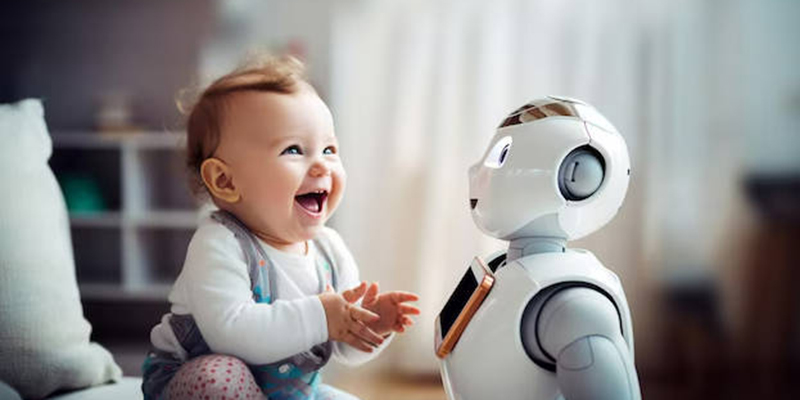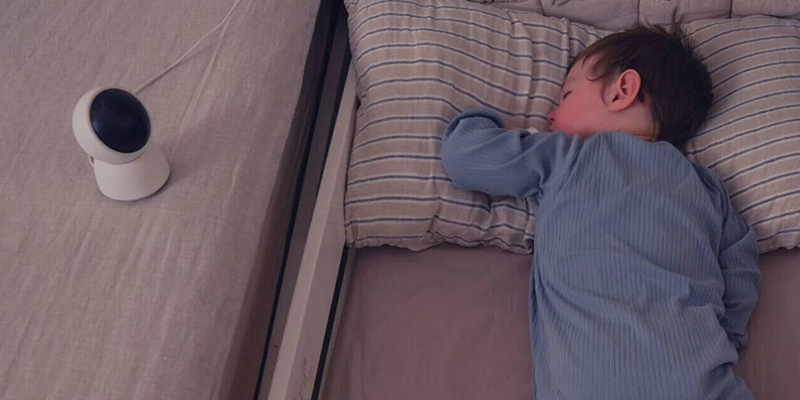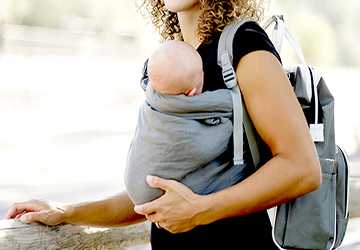Robotic Assistants For Infant Care: The Next Generation Of Parenting Tools
In the multifaceted panorama of modern existence, the convergence of professional obligations and parental responsibilities can induce a state of overwhelming difficulty. The inception of robotic infant care assistants ushers in a paradigmatic shift in child-rearing, offering an unparalleled echelon of succour for overextended parents. These robotic infant care assistants are carefully contrived to undertake many responsibilities, ranging from assiduous health surveillance to engaging stimuli and even provisioning assistance with alimentary routines.

The Entrenchment Of AI Parenting Tools In Domestic Paradigms
Implementing AI parenting tools within domiciliary environments has precipitated childcare transformation. These tools, endowed with sophisticated algorithms, acclimate to the singular peculiarities of each child, rendering the parenting process both bespoke and efficacious. AI parenting tools meticulously catalogue sleep cycles, orchestrate feeding schedules and discern even the subtlest alterations in a child's mood or physiological state. This instantaneous intel empowers parents to make wise decisions with alacrity.
Distinguished Attributes Of Robotic Infant Care Assistants
- Vital Surveillance: Robotic infant care assistants are outfitted with avant-garde sensors that meticulously monitor vital parameters such as cardiac rhythm, body thermoregulation, and respiratory cadence, providing prompt alerts if any anomalies are detected.
- Interactive Stimulation: These erudite devices captivate infants through interactive engagements, fostering cognitive development via activities and games meticulously curated to align with the child's developmental trajectory.
- Alimentary Facilitation: Select robotic infant care assistants are equipped with the capacity to assist in the administration of nourishment, ensuring the infant’s nutritional needs are met even in the absence of direct parental involvement.
- Somnolence Optimization: By continuously monitoring sleep patterns and providing soothing auditory or kinetic stimuli, robotic infant care assistants facilitate enhanced infant sleep quality and duration.
- Cognitive Stimulation: Robotic infant care assistants are embedded with avant-garde sensory architectures that meticulously appraise and modulate the infant's neurocognitive exigencies, delivering highly curated stimuli that foster synaptic plasticity and neural proliferation.
- Physiological Metrics Monitoring: These sophisticated devices exhibit a preternatural aptitude for meticulously cataloguing physiological growth metrics, ranging from minute weight oscillations to intricate motor coordination. Thus, they provide an empirical substrate that optimizes infantile health prognoses.
- Environmental Calibration: Equipped with hyper-sophisticated environmental sensors, robotic infant care assistants can dynamically modulate the infant’s proximal milieu, such as fine-tuning photonic illumination or ambient sonority, ensuring an impeccably calibrated caregiving environment.
The Profound Implications Of Robotic Baby Care Technology On Parenting Dynamics
Robotic baby care technology has engendered a profound transformation in parenting, offering unprecedented assistance. This vanguard technology enables parents to redirect their focus towards other dimensions of life, confident that their infant is receiving excellent care. Robotic baby care technology encompasses an extensive repertoire of devices, from automated cribs that react to an infant's cries to advanced monitoring systems that furnish real-time data on the child's condition.
Merits Of Robotic Baby Care Technology
- Cognizant Reassurance: Robotic baby care technology imparts parents a heightened sense of security by delivering unceasing monitoring and instantaneous feedback regarding their infant's status.
- Temporal Liberation: By automating quotidian caregiving tasks such as feeding and pacifying, robotic baby care technology empowers parents to reclaim valuable temporal assets, thereby streamlining the management of their daily obligations.
- Augmented Safety: With innovations such as thermoregulation and fall detection, robotic baby care technology significantly enhances the safety of the infant’s environment, thereby mitigating the risk of untoward incidents.
The Prospective Evolution Of AI Parenting Tools
As technology's inevitable progression continues, the prospective advancements in AI parenting tools appear exceedingly auspicious. Forthcoming innovations are poised to augment the capabilities of these tools further, embedding them even more deeply within the substratum of parenting. Future iterations of AI parenting tools may encompass functionalities such as affective state recognition, enabling the AI to discern and respond to a baby's emotional state, or predictive analytics capable of anticipating an infant's needs based on comprehensive data aggregation.
Nascent Trends In AI Parenting Tools
- Affective Recognition: The forthcoming cohort of AI parenting tools will likely incorporate the ability to perceive and respond to an infant's emotional state, offering commensurate comfort or stimulation in real-time.

- Prognostic Analytics: By analyzing behavioural trajectories, AI parenting tools could prognosticate essential needs such as hunger, sleep, or discomfort, allowing parents to address their child's requirements preemptively.
- Advanced Vocal Interaction: Future AI parenting tools may boast enhanced vocal interaction capabilities, facilitating seamless communication between parents and the device.
Ethical Considerations In The Proliferation Of Robotic Infant Care Assistants
While the manifold benefits of robotic infant care assistants are incontrovertible, salient ethical considerations necessitate scrupulous deliberation. The burgeoning reliance on technology in child-rearing engenders concerns regarding the potential attenuation of human touch and connection. Moreover, issues about data privacy and the security of the information accrued by these devices must be assiduously addressed. As robotic infant care assistants become more deeply ingrained in quotidian life, these ethical quandaries must be managed with the utmost diligence, ensuring that the technology serves to augment, rather than supplant, the parent-child bond.
Addressing Ethical Concerns
- Preserving Human Connection: Parents should employ robotic infant care assistants as adjuncts to avoid overdependence on technology, not substitutes for direct human interaction.
- Data Sovereignty: Developers of robotic infant care assistants must prioritize the sanctity of data, ensuring that sensitive information is meticulously safeguarded against potential incursions.
- Lucidity and Transparency: Parents must be provided with explicit, comprehensive guidelines on data collection, utilization, and storage, ensuring they are fully apprised and comfortable with the technology's application.
The Strategic Role Of AI Parenting Tools In Enhancing Cognitive Development
AI parenting tools have become quintessential in nurturing infants' neurocognitive and affective development, bridging the lacunae that human caregivers may inadvertently overlook. These tools employ complex machine learning algorithms and adaptive neural networks to anticipate developmental milestones with uncanny accuracy, thereby cultivating an optimal environment for intellectual maturation and emotional resilience.
Neuroadaptive Learning Systems
- Idiosyncratic Learning Modules: AI parenting tools harness neuroadaptive learning systems to curate educational modules precisely tailored to align with the infant's unique cognitive architecture and developmental trajectory.
- Behavioral Recalibration Loops: By implementing sophisticated behavioural recalibration loops, these tools continuously refine their interactive algorithms in response to the infant's evolving actions, ensuring that the child's burgeoning capabilities dynamically adjust cognitive challenges.
- Real-time Affective Modulation: AI parenting tools have the capacity for real-time affective modulation. They recalibrate their interactions in response to subtle affective cues, such as microexpressions or vocal inflexions, thereby fostering robust emotional intelligence from an embryonic stage.
Conclusion
Cybernetic neonatal custodians, autogenous nurturing algorithms, and mechanized infantile care apparatus represent the apotheosis of avant-garde parental ingenuity, conferring an unprecedented echelon of succour and equanimity to contemporary households. As these arcane technologies persist in their relentless progression, their confluence with the procreative axiom will intensify, endowing guardians with the requisite armamentarium to guarantee their progeny receive excellent attention.











